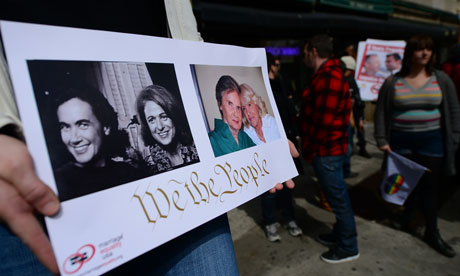
Marriage equality supporters march in New York on Sunday ahead of the US supreme court arguments. Photograph: Emmanuel Dunand/AFP/Getty Images
From the Guardian:
On Tuesday, the justices will hear arguments over California’s ban on same-sex marriage after a 2008 referendum, Proposition 8, overturned a state supreme court decision in favour of gay unions, and amended the state constitution to say that “only marriage between a man and a woman is valid or recognized in California”.
The following day, the court will consider whether a 1996 law passed by Congress blocking the federal government from recognising same-sex marriages, the Defense of Marriage Act (Doma), is constitutional.
That case has pitted the Obama administration against the Republican leadership in Congress. The White House said two years ago it would no longer defend Doma, which denies married gay couples – including members of the military – tax, financial and welfare benefits available to heterosexuals.Congressional Republicans hired a lawyer – Paul Clement, the former US solicitor general who argued and lost the case against Barack Obama’s healthcare reforms — to defend Doma. But one of the first things the justices have to decide is whether Congress has the authority, known as “standing”, to even bring the case to the supreme court after the US Justice Department decided not to challenge an appeal court ruling striking down Doma as unconstitutional.
The challenge to Doma was brought by Edith Windsor, who was married to Thea Spyer in Canada in 2007. The couple lived in New York, where their marriage was recognised by the state government.
But when Spyer died in 2009, the federal government invoked Doma to force Windsor, who is now 83 and in poor health, to pay $363,000 in taxes on her late wife’s estate – a charge she would have been exempt from if she had been married to a man.
Windsor’s lawyer, Roberta Kaplan, will tell the supreme court she is not seeking to establish a right for same-sex couples to marry but to oblige the federal government to recognise those marriages in states that permit them.
(10)



